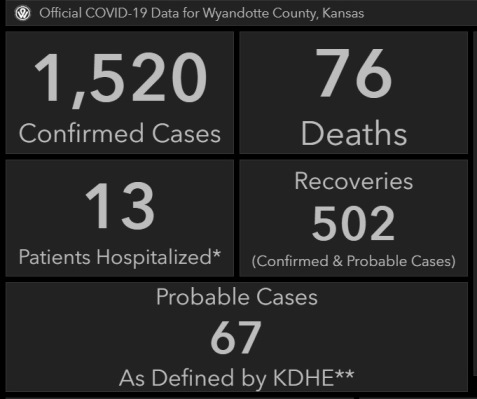
Traveling during the COVID-19 pandemic can be a challenge.
What is the safest way to travel? What mode of transportation should you take? Should you even travel at all?
Doctors at the University of Kansas Health System said it might be safer now to travel by plane, with safety precautions that have been put in place.
Dr. Wissam El Atrouni, associate professor of medicine in the division of infectious diseases at the University of Kansas Medical Center, said air travel is safer with various precautions that have been taken, such as extra cleaning and social distancing. Planes are often half-empty and passengers can socially distance. There are also changes at the airports to make it safer, and a lot of the stores there were closed.
He said he would recommend wearing a mask on the airplane, using hand sanitizer and social distancing.
The drawback to air travel is you don’t choose who sits next to you and you might not know if they have an infection or symptoms, according to Dr. El Atrouni.
Dr. Steve Stites, chief medical officer at KU Health System, said it’s all about the bubble and who is in it. In a car, you have control over who’s in your bubble and on a plane, there isn’t that degree of control.
There is a certain amount of anxiety people have about traveling, according to Dr. Danielle Johnson, a psychologist. It goes back to what they can control and what they can’t, she said.
In cars, people can sanitize the vehicle and know who’s in it and who’s not, while on an airplane they don’t have that sense of control.
A lot of people may struggle with the fact they have to accept what they can’t change, she said. If people decide they want to take a trip for their own mental health, for example, they may want to do things that make them feel safer, such as wearing masks, social distancing and using hand sanitizer.
Some people may benefit from building up to a larger trip by taking some smaller trips first, she said.
Dr. Dana Hawkinson, medical director of infection prevention and control at KU Health System, said people may want to wear masks and eye protection while flying on a plane. They probably don’t need gloves, he said. Hand hygiene is important, he added.
Dr. El Atrouni, who has enjoyed traveling in the past, said he doesn’t have any plans for immediate travel. He reminded travelers to check the rules for states they want to travel to, and see if a quarantine is needed, and also to check their own state’s rules to see if a quarantine is needed coming back from the trip.
He said he would hesitate to make an international trip because of the risk that there could be a second wave that could make it difficult to come back.
He also said the epidemic isn’t over yet, and people should continue to take precautions such as wearing masks and social distancing.
Individuals are facing anxiety, a sense of loss and grief as the effects of COVID-19, Dr. Johnson said.
According to Dr. Johnson, families and individuals may find some sense of control through regularly scheduled activities such as meditation, yoga and running.
Dr. Greg Nawalanic, a psychologist, said working at home, and at the same time being with the family, can be stressful.
He said structure is a great benefit to people. Set a time to get up, to go to bed and have a dedicated work space, he said.
Two-parent families should work as a “tag team,” one working while the other takes care of the kids, then swap, he said.
With more people traveling this summer, there is a question about how to handle family gatherings.
Dr. El Atrouni said he would worry about elderly members of the family and those with health conditions, and also if they are in a high-risk exposure area.
Dr. Hawkinson said people could find out about the other family members who are coming in. Some data show that wearing a mask in family households reduces transmission as well, he said, and may be an option if the gathering is in a confined space. Otherwise, be outdoors as much as possible, he advised, and be careful to clean surfaces and avoid touching hands to the face.
Dr. Johnson said it’s possible to go outdoors to have a gathering with family. Set up tables outdoors, socially distance and find creative ways to get together, she said.
Dr. Stites said a lot has to do with a person’s tolerance of risk. It’s a personal decision.
Travel and gatherings are not as safe as home, he said, but things can be done to minimize the risk, such as social distancing, washing hands and wearing masks.
Dr. Hawkinson reported KU Health System had 11 positive COVID-19 patients on Tuesday morning, up one from Monday. Five persons were in the intensive care unit and two on ventilators.
In Wyandotte County, the Unified Government COVID-19 website at 4 p.m. Tuesday reported 1,520 positive cumulative cases, with 76 deaths and 13 hospitalizations. It was an increase of 18 cases since 1 p.m. Monday, and an increase of one death since Monday.
On Wednesday, June 10, a pop-up testing site is at New Bethel Church – Forest Grove Baptist Church, 745 Walker Ave., from 2 p.m. to 5 p.m. For more information, visit https://wyandotte-county-covid-19-hub-unifiedgov.hub.arcgis.com/pages/what-to-do-if-you-think-you-have-covid-19.
The KU doctors’ news conference is online at https://www.facebook.com/kuhospital/.
The UG’s COVID-19 information page is at https://alpha.wycokck.org/Coronavirus-COVID-19-Information.
Wyandotte County is currently under Phase 3. See covid.ks.gov.
The state plan’s frequently asked questions page is at https://covid.ks.gov/wp-content/uploads/2020/05/Reopening-FAQ_5.19.2020_Final.pdf.
Test sites are listed at https://wyandotte-county-covid-19-hub-unifiedgov.hub.arcgis.com/pages/what-to-do-if-you-think-you-have-covid-19.
The CDC’s COVID-19 web page is at https://www.cdc.gov/coronavirus/2019-nCoV/index.html.
